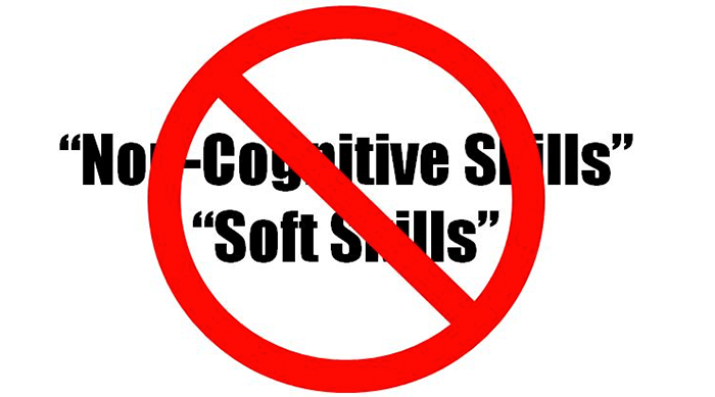Why Schools Need to Change
It’s Time to Trash the Terms “Non-Cogs” and “Soft Skills”
Topics

Today’s learners face an uncertain present and a rapidly changing future that demand far different skills and knowledge than were needed in the 20th century. We also know so much more about enabling deep, powerful learning than we ever did before. Our collective future depends on how well young people prepare for the challenges and opportunities of 21st-century life.
Andy Calkins presents an argument for new language that is more accurate, less comparative, and less antagonistic.
They’re everywhere: in print, in conversation, in conference sessions. Invariably, including at SXSWedu last week, references to “the Non-Cognitives” and to “Soft Skills” are accompanied by grimaces and expressions of how much we dislike those terms—but then we use them anyway.*
On every metric that counts—clarity, accuracy, purposefulness, and impact—both of these terms stink. They fail so badly, in fact, that they may do more harm than good, even coming out of the mouths and laptops and podiums of people who are passionate about elevating the visibility of these important skills and increasing their role in the design of learning and schools.
I am a passionate member of that camp. Somewhere, there’s probably archived evidence of my using “Non-Cog” and “Soft Skills” in settings outside of the privacy of my home. But I hereby commit to never doing so again. (Except as part of this eradication process.) Join me! The solution to this dilemma is at hand. Let’s just stop using them, and replace them with something better.
"Let's come up with language that is more confidently assertive, a term for "Non-Cogs" that exhibits courage, tenacity, self-efficacy, and grit."
Herewith: four reasons to do so, and a suggestion for alternative language.
1. These terms mean nothing. “Non-Cog” is especially bereft of meaning. We are fighting a losing battle and setting back our own cause the minute we use it. In uttering “Non-Cog,” we implicitly acknowledge that the concept is so lame, it lacks even a workable label. It can only be defined by what it is not. The term “Soft Skills” is better on this score but not by much. It is also meaningless except as a counterpoint to the much more crucial-sounding “Hard Skills.”
2. These terms are inaccurate. Collaboration? Persistence? Self-management? Grit? Are these really traits that don’t require any form of cognition? One of our NGLC grantees describes the grit he sees in his middle school students who have to plot their walking route to school with care, lest they get shot. That’s Cognition with a capital C. And would it seem appropriate to call these students’ courage, tenacity, resilience, and decision-making ability “soft”? You're right: it would not.
3. These terms set bad practice in motion. It gets worse. In using terms that can only be understood as the “yin” to cognition’s “yang,” we effectively define them by their separateness. The resulting tendency—when well-intended but insufficiently considered concepts become policy and policy becomes practice—is that the fault-lines in the idea become vast canyons in students’ experience of school. “From 10am to 11am: Hard Skill Time. From 11am to noon: Soft Skill Time.” Ugh!
It’s just too distressingly easy to imagine policies in coming years (crafted, again, with the best of intentions) that require x percent of each child’s school day be devoted to development of their “Non-Cogs.” Development of these skills doesn’t happen in compartmentalized units, and schools don’t have time in their day to even try to do so.
Schools that show promise in building the whole continuum of “hard” and “soft” skills are doing so through deliberate integration across their students’ entire learning experience. (See NGLC grantees Generation Schools, Summit Public Schools, the Workshop School, Thrive Public Schools, and e3 Civic High, along with High Tech High, for some examples.)
4. These terms utterly fail to embody their meaning, and so lose much of their potential impact. It’s as if we who have advocated for this side of the skill development spectrum all got together and embraced terms specifically invented for us by “Cog” scientists and “Hard Skill” hard-liners. I’m not saying there’s a conspiracy afoot here, but… really, can’t we come up with language for all of this that is more confidently assertive? A label that says what this is about, and doesn’t content itself with what it is not? Can’t we come up with a term for “Non-Cogs” that exhibits courage, tenacity, self-efficacy, and grit?
As a matter of fact, many of us—on both the policy and practice sides—already use a term that meets these criteria well. We just need to promote it to the top of label-pile. That term is Agency.
Agency fits the bill on at least two important levels:
- It encompasses the self-efficacy and -management capacities that our standards-era, No Excuses-driven focus on ELA and math proficiency has overlooked. (See how the Council of Chief State School Officers uses the term at the top of its list of “Dispositions” required for college, career, and citizenship readiness (p.6).) Students particularly need agency to thrive in what is becoming a global, 21st-century, free-agent economy.
- It embodies ownership and deep engagement—the pillars on which virtually all of the new models of personalized, next gen learning schools are being designed and built. (See how Eduardo Briceño, Co-Founder & CEO of Carol Dweck’s shop Mindset Works, describes the importance of student agency in High Tech High’s Unboxed journal.)
The importance of Agency to student success in college, career, and life is profound. But my point in this blog is not to convince anyone on that point. (See Tom Vander Ark’s excellent summary, this week, of next gen student success definitions if you need convincing.) It is to suggest a brief pause, reflection, and deliberate adoption of language that lives up to the central importance of persistence, self-control, curiosity, conscientiousness, grit and self-confidence (Paul Tough’s partial list from How Children Succeed) in students’ genuine readiness for everything they encounter during their PreK-12 experience—and everything that will follow.
The real challenge, of course, doesn’t lie in the labeling, blogging, and conference room palaver. It lies in the work of visionary educators who are right now creating and running breakthrough model schools—schools incorporating next gen, personalized, competency-based, student-centered, experiential, disruptively blended learning. Later this spring, NGLC will release our MyWays project, designed to support their work with a wide range of tools organized around a synthesized, “new normal” framework for student success in the 21st century.
For now, let’s give these pioneers more wind in their sails by deleting “Non-Cog” and “Soft Skills” from the lexicon. Just give Agency a try, next time you’re tempted to use those other terms. You’ll be helping the field give weight, coherence, and legitimacy to the entire definition of student success, each time you do.




